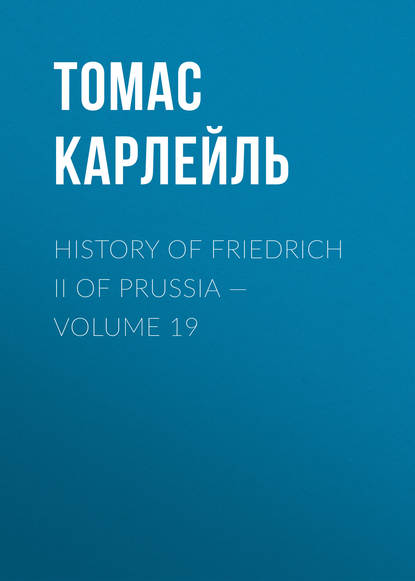 Полная версия
Полная версияHistory of Friedrich II of Prussia — Volume 19
"I am unfortunate and old, dear Marquis; that is why they persecute me: God knows what my future is to be this Year! I grieve to resemble Cassandra with my prophecies; but how augur well of the desperate situation we are in, and which goes on growing worse? I am so gloomy to-day, I will cut short.... Write to me when you have nothing better to do; and don't forget a poor Philosopher who, perhaps to expiate his incredulity, is doomed to find his Purgatory in THIS world." [OEuvres de Frederic, xix. 138, 139 ("Freyberg, 20th March, 1760").]... To another Friend, in the way of speech, he more deliberately says: "The difficulties I had, last Campaign, were almost infinite: such a multitude of enemies acting against me; Pommern, Brandenburg, Saxony, Frontiers of Silesia, alike in danger, often enough all at one time. If I escaped absolute destructiou, I must impute it chiefly to the misconduct of my enemies; who gained such advantages, but had not the sense to follow them up. Experience often corrects people of their blunders: I cannot expect to profit by anything of that kind; on their part, in the course of this Campaign:" judge if it will be a light one, MON CHER. [To Mitchell, one evening, "Camp of Schlettau, May 23d" (Mitchell, ii. 159).]
The symptoms we decipher in these Letters, and otherwise, are those of a man drenched in misery; but used to his black element, unaffectedly defiant of it, or not at the pains to defy it; occupied only to do his very utmost in it, with or without success, till the end come. Prometheus, chained on the Ocean-cliffs, with the New Ruling-Powers in the upper hand, and their vultures gradually eating him; dumb Time and dumb Space looking on, apparently with small sympathy: Prometheus and other Titans, now and then, have touched the soul of some AEschylus, and drawn tones of melodious sympathy, far heard among mankind. But with this new Titan it is not so: nor, upon the whole, with the proper Titan, in this world, is it usually so; the world being a—what shall we say?—a poorish kind of world, and its melodies and dissonances, its loves and its hatreds worth comparatively little in the long-run. Friedrich does wonderfully without sympathy from almost anybody; and the indifference with which he walks along, under such a cloud of sulky stupidities, of mendacities and misconceptions from the herd of mankind, is decidedly admirable to me.
But let us look into the Campaign itself. Perhaps—contrary to the world's opinion, and to Friedrich's own when, in ultra-lucid moments, he gazes into it in the light of cold arithmetic, and finds the aspect of it "frightful"—this Campaign will be a little luckier to him than the last? Unluckier it cannot well be:—or if so, it will at least be final to him!



